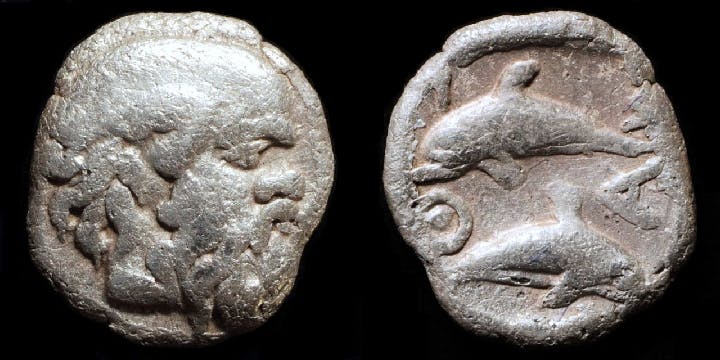Winter 2011
The War of Symbols
– James Carman
The outcome of battles during the Peloponnesian War often hinged as much on misapprehensions and chance as on bravery and superior military skill.
"The growth of the power of Athens, and the alarm which this inspired in Sparta, made war inevitable,” wrote Thucydides in his fifth-century BC chronicle of the Peloponnesian War. Most scholars have accepted his explanation for the causes of the three-decade struggle that reshaped the Greek world. Thucydides’ writings greatly influenced the thinking of 17th-century political philosopher Thomas Hobbes about how and why great powers come into conflict. Together, writes University of Virginia historian J. E. Lendon, Thucydides and Hobbes are “the progenitors of the theoretical realism that abides in today’s universities and think tanks.”
But Lendon demurs. He argues that the first 10 years of the Peloponnesian War are best understood not as a struggle between two mighty opponents for survival, but as an often petty contest over timê, “which consisted of esteem by others and others’ confirmation of one’s lofty impression of one’s own merits,” with the rest of the Greek world occupying the twin roles of audience and judge.
When the war began, in 431 BC, Sparta, both because of its heroic defense against the Persians at Thermopylae earlier in the century and its frequently demonstrated prowess in land battles, possessed the greater timê, and had allied itself with other land-based powers such as Corinth. But Athens dominated the seas and had acquired its own empire of tribute-paying islands. The resulting wealth had enabled the Athenians to build the mighty Acropolis as well as an impregnable wall that protected their port of Piraeus, and they hungered to be seen as Sparta’s equal.
Although the surest way to win such respect was to defeat Sparta on the battlefield, Pericles and other Athenian leaders knew there was little hope of that. Instead, Athens employed a strategy that the playwright Aristophanes later described as “one pot, whacked, kicking back in anger at another pot.” When Spartan forces marched into their lands, the Athenians refused to fight, and the invading warriors could only destroy the crops that lay outside the city walls. Athens, meanwhile, sent its dreaded triremes around the Peloponnesian peninsula, raiding and destroying coastal villages and harrying far-off allies of Sparta to whom the Spartans could not provide promised defense. Though each side worried at various points that its adversary was angling for a destructive advantage, the war was never about extermination.
Lendon is a gifted storyteller and military historian. His Soldiers and Ghosts (2005) is a rewarding journey through classical warfare from the Trojan War to the Roman conquests, and the ancient battles he reenacts with his University of Virginia students are regular campus spectacles. In Song of Wrath, he deftly explains how battles could turn as much on misapprehensions and chance as on bravery and superior skill. This was especially true at Pylos and Sphacteria (425 BC), where Sparta suffered its most ignoble defeat and—almost unthinkable!—surrendered rather than fight to the death. Lendon writes that “after that Sparta was merely playing for a draw,” which it achieved after besting the Athenians in several battles.
Although most histories of the Peloponnesian War encompass the intervening decade of uneasy peace that followed and Sparta’s eventual defeat of Athens at the great sea battle of Aegospotami in 405 BC, Lendon ends his history with the Peace of Nicias in 421 BC, when the Athenians were up. “The Athenians won both the war itself and, no less necessary in a war of symbols, the simultaneous war to define victory and defeat,” he writes. In his view, the Athenians’ subsequent doom—including their devastating loss of more than 40,000 men who were killed or taken prisoner in a risky expedition to Sicily in 415–413 BC—was brought on only when they “began to look around for some mighty deed they could perform that would raise their rank in the eyes of the Greeks.”
Athens was not, of course, the last power that would overreach and sow the seeds of its own destruction, which is one reason why the world still seeks to draw lessons from this long-ago struggle. But today, Lendon says, the Peloponnesian War’s most telling insights may be about “international actors whose aims and actions the contemporary West finds it hardest to understand and manage: the wrathful ones . . . who seek revenge for ancient slights.”
* * *
James Carman is managing editor of The Wilson Quarterly.
Reviewed: "Song of Wrath: The Peloponnesian War Begins" by J.E. Lendon, Basic Books, 2010.
Cover photo courtesy of Wikimedia Commons
